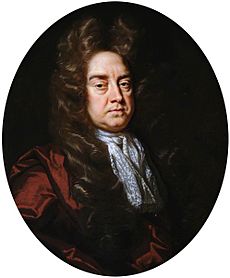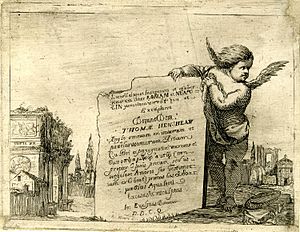Thomas Henshaw (alchemist) facts for kids
Thomas Henshaw (1618–1700) was an English man who lived a long time ago. He was a lawyer, a courtier (someone who worked for the king), a diplomat (someone who represented his country in other nations), and a writer about science. Even though he didn't publish books about it, he was very important in the world of alchemy in England from the 1650s. Alchemy was an old practice that tried to turn common metals into gold and find a way to live forever.
Contents
Thomas Henshaw's Early Life and Education
Thomas Henshaw was born in London and was baptized on June 15, 1618. He went to school in Barnet and London. Later, he studied at University College, Oxford, for five years, starting in 1634. He was very interested in mathematics and learned from a famous teacher named William Oughtred.
Henshaw also studied law at the Middle Temple. In 1637, he became a tutor there for John Evelyn and his brothers. John Evelyn became a close friend for life. When the First English Civil War began, Henshaw joined King Charles I's side. He was later captured by the Parliamentarians, who were against the King.
Travels in Europe
Thomas Henshaw was allowed to leave England after promising not to fight for the King again. He sailed to Holland and joined a military campaign there. After that, he joined the French army and became a major. He also traveled through Spain and Italy, living in cities like Rome, Venice, and Padua.
From late 1644, Henshaw traveled with his friend John Evelyn in Italy. They visited interesting places together, like Athanasius Kircher's famous rooms in Rome. Henshaw also spent time with Henry Howard. Henshaw returned to England around 1650.
Life During the Commonwealth Period
When Thomas Henshaw came back to England, he lived quietly in Kensington, which was then outside London. This was during the time of the Commonwealth of England, when England was ruled by Parliament, not a king.
Henshaw was part of a "chemical club" that started in 1650. He worked with other scientists, including Thomas Vaughan. Henshaw claimed to have found the alkahest, which was believed to be a universal solvent that could dissolve anything. He was known as an expert in the scientific ideas of his time. His large library was very helpful to other scholars like Elias Ashmole.
Henshaw also had ideas for creating an English academy, a type of college for learned people. He lived in a property called Pondhouse in Kensington, where a group of eight scholars, including Henshaw and Vaughan, formed a "Christian Learned Society." This group shared ideas about learning and knowledge.
In 1654, Henshaw became a lawyer, but he soon stopped practicing law. He sold his place at the Middle Temple in 1658. Around this time, he also attended meetings of a group of scientists and philosophers at Gresham College.
Later Life and Royal Society Work
Thomas Henshaw was one of the people who helped set up the Royal Society, a famous group for scientists. He became a Fellow (a member) of the Royal Society in 1663, when it was first created. He continued his alchemy research with Sir Robert Paston. He also worked with Robert Hooke to keep the Society active in the 1670s.
In 1672, Henshaw traveled to Denmark as a secretary for the Duke of Richmond, who was an ambassador. After the Duke died, Henshaw stayed in Denmark for two and a half years as an envoy, representing England. Later, he became an under-secretary for French affairs and a gentleman of the privy council for King Charles II. He continued in this role under King James II and King William III.
Thomas Henshaw spent his final years at his home in Kensington. He passed away on January 2, 1700.
Published Works
Thomas Henshaw translated a book from Italian called History of the Great and Renowned Monarchy of China. This book was published in London in 1655. He also wrote short papers for the Philosophical Transactions of the Royal Society, which was a scientific journal. These papers included instructions on how to make Salt Peter and Gunpowder. He also helped edit a dictionary of the English language called Etymologicon Linguæ Anglicanæ in 1671.
Family Life
Thomas Henshaw was married to Anne Kipping. They had six sons and two daughters. His wife died on October 4, 1671. Their daughter Anne was his only child who survived him. She married Thomas Halsey.
 | Kyle Baker |
 | Joseph Yoakum |
 | Laura Wheeler Waring |
 | Henry Ossawa Tanner |



